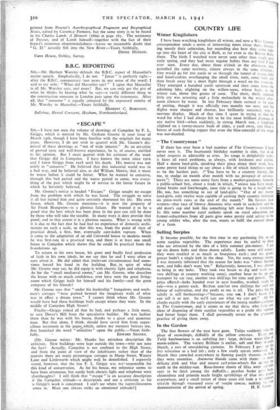Selling Surplus It became possible ; for the first time in
my gardening life, to sell some surplus vegetables. The experience may be useful to those who are attracted by the idea of a little summer pin-money. I put up six dozen leeks and three dozen salsify. Leeks were still scarce; they were retailed at as much as fourpence each ; and my green- grocer hadn't a single leek in the shop. Yet, for some strange reason, I was instantly informed that the season for leeks was " about finished now, and folks don't want 'em." Reluctantly, however, I was allowed to bring in my leeks. They took two hours to dig and wash (say, two shillings at country working rates), another hour to tie up and transport by car (say, another two shillings for time and petrol). The price offered—leeks handed over in neat bundles, washed, ready for sale—was a penny each. Reckon another two shillings for seed and labour of cultivation, and the profit to me is nil. The price for the salsify is still forthcoming—" because, you sae, I don't know if I can sell it or not. So we'll just see what we can get." All this checks exactly with the early experiences of the young market-gardeners in The Countryman, and it seems to me that those who have cosy ideas of disposing of their surplus vegetables at a profit this summer had better forget them. I shall personally revert to the pleasanter practice of giving them away.






































 Previous page
Previous page